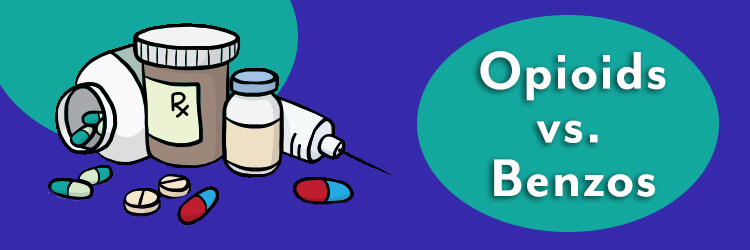[vc_row][vc_column][vc_column_text]Benzodiazepines (often called “benzos”) and opioids are both common drugs of abuse, but they are used for different purposes.
Benzos are tranquilizers or sedatives—such as Valium, Klonopin, and Xanax—often prescribed for anxiety, insomnia, muscle relaxation, and detox from alcohol. However, about 17% of people who take benzos misuse them.
In recent decades, benzo use has been steadily rising. Between 1996 and 2013, the number of people filling a benzo prescription increased by 67%. However, only about 20% of people who misuse benzos receive them from their doctor, while the other 80% get them from friends or family members.
Opioids are a class of drugs used for pain relief. This includes prescription drugs such as Morphine and OxyContin, as well as non-prescription drugs like heroin. All opioids interact with the opioid receptors in the brain and body, which exist to process naturally-produced opioids such as endorphins.
You have probably heard of the Opioid Crisis, so you know that opioids can be addictive. According to the National Institute on Drug Abuse, about 21-29% of people prescribed opioids for chronic pain misuse them. Of those, 4-6% transition to heroin use. About 80% of people who use heroin found their way to the drug through prescription opioids.
While opioids and benzos are a different class of drug, more than 30% of overdoses involving opioids also involve benzos. Between 2001 and 2013, there was an increase in the number of people receiving simultaneous prescriptions for both of these drugs. This combination can be particularly dangerous because both drugs slow breathing. One study found that the death rate among people taking both benzos and opioids was ten times higher than that of people only taking opioids.
But if you are struggling with a substance use or mental health disorder, there is hope. TruHealing Centers across the country provide high-quality, personalized treatment. Our staff—many of whom are in recovery themselves—will help you work through traumas and build the coping skills to thrive in long-term recovery. Call an admissions specialist at 410-593-0005.[/vc_column_text][/vc_column][/vc_row]









